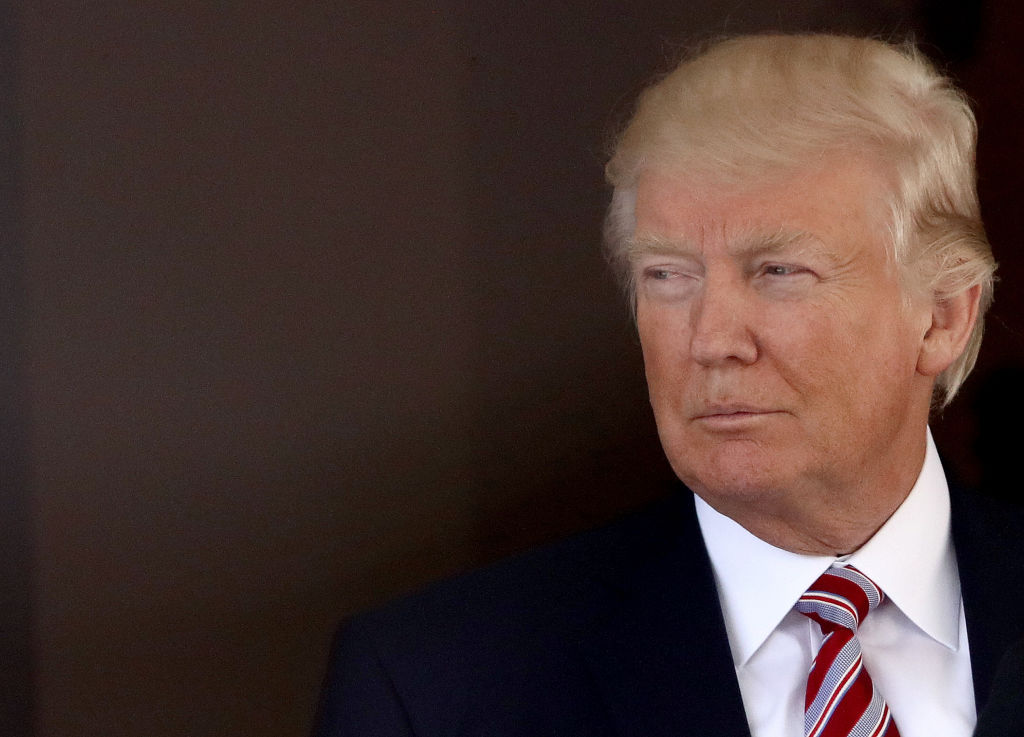Trump told Russians he fired 'nut job' Comey to ease the pressure of the Russia probe


A free daily email with the biggest news stories of the day – and the best features from TheWeek.com
You are now subscribed
Your newsletter sign-up was successful
President Trump reportedly told Russia's foreign minister and ambassador in a meeting last week that he fired FBI Director James Comey in order to take off the "pressure" of the Russia probe, The New York Times reports.
"I just fired the head of the FBI. He was crazy, a real nut job," Trump told the Russians. "I faced great pressure because of Russia. That's taken off." The comments were recorded in a White House document that was compiled based on notes taken during the meeting and distributed as an official account of the event; it was read by a U.S. official to the Times.
White House Press Secretary Sean Spicer did not contradict the report, saying: "By grandstanding and politicizing the investigation into Russia's actions, James Comey created unnecessary pressure on our ability to engage and negotiate with Russia."
The Week
Escape your echo chamber. Get the facts behind the news, plus analysis from multiple perspectives.

Sign up for The Week's Free Newsletters
From our morning news briefing to a weekly Good News Newsletter, get the best of The Week delivered directly to your inbox.
From our morning news briefing to a weekly Good News Newsletter, get the best of The Week delivered directly to your inbox.
The White House's official story had been that Trump lost faith in Comey's ability to do his job due to his handling of the investigation into Hillary Clinton's use of a private email server while secretary of state. Earlier Friday, Deputy Attorney General Rod Rosenstein defended a memo he wrote to Trump outlining his concerns with Comey, in which he detailed a series of missteps he felt Comey had made that led him to believe "it was appropriate to seek a new leader" for the FBI.
A memo written by Comey, reported earlier this week, claimed Trump had tried to convince Comey to end his investigation into Trump's former National Security Adviser Michael Flynn, who is at the heart of the ongoing Russia investigations.
A free daily email with the biggest news stories of the day – and the best features from TheWeek.com
Jeva Lange was the executive editor at TheWeek.com. She formerly served as The Week's deputy editor and culture critic. She is also a contributor to Screen Slate, and her writing has appeared in The New York Daily News, The Awl, Vice, and Gothamist, among other publications. Jeva lives in New York City. Follow her on Twitter.
-
 What are the best investments for beginners?
What are the best investments for beginners?The Explainer Stocks and ETFs and bonds, oh my
-
 What to know before filing your own taxes for the first time
What to know before filing your own taxes for the first timethe explainer Tackle this financial milestone with confidence
-
 The biggest box office flops of the 21st century
The biggest box office flops of the 21st centuryin depth Unnecessary remakes and turgid, expensive CGI-fests highlight this list of these most notorious box-office losers
-
 Judge blocks Hegseth from punishing Kelly over video
Judge blocks Hegseth from punishing Kelly over videoSpeed Read Defense Secretary Pete Hegseth pushed for the senator to be demoted over a video in which he reminds military officials they should refuse illegal orders
-
 Trump’s EPA kills legal basis for federal climate policy
Trump’s EPA kills legal basis for federal climate policySpeed Read The government’s authority to regulate several planet-warming pollutants has been repealed
-
 House votes to end Trump’s Canada tariffs
House votes to end Trump’s Canada tariffsSpeed Read Six Republicans joined with Democrats to repeal the president’s tariffs
-
 Bondi, Democrats clash over Epstein in hearing
Bondi, Democrats clash over Epstein in hearingSpeed Read Attorney General Pam Bondi ignored survivors of convicted sex offender Jeffrey Epstein and demanded that Democrats apologize to Trump
-
 El Paso airspace closure tied to FAA-Pentagon standoff
El Paso airspace closure tied to FAA-Pentagon standoffSpeed Read The closure in the Texas border city stemmed from disagreements between the Federal Aviation Administration and Pentagon officials over drone-related tests
-
 Judge blocks Trump suit for Michigan voter rolls
Judge blocks Trump suit for Michigan voter rollsSpeed Read A Trump-appointed federal judge rejected the administration’s demand for voters’ personal data
-
 US to send 200 troops to Nigeria to train army
US to send 200 troops to Nigeria to train armySpeed Read Trump has accused the West African government of failing to protect Christians from terrorist attacks
-
 Grand jury rejects charging 6 Democrats for ‘orders’ video
Grand jury rejects charging 6 Democrats for ‘orders’ videoSpeed Read The jury refused to indict Democratic lawmakers for a video in which they urged military members to resist illegal orders
